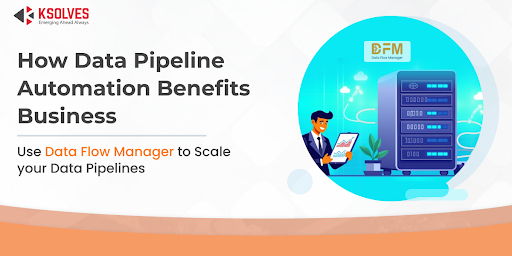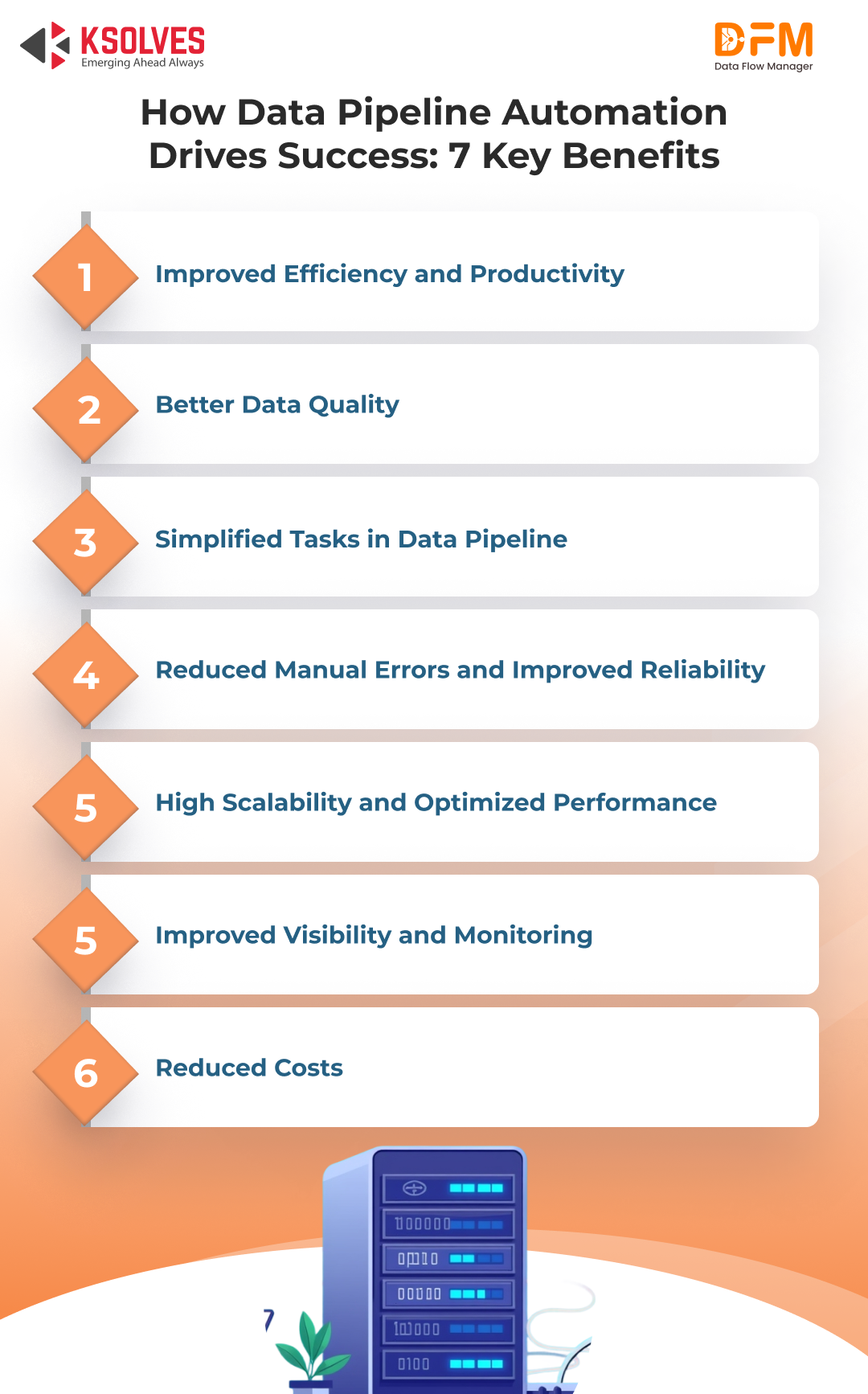7 Game-Changing Benefits of Data Pipeline Automation for Modern Businesses
![]()

Today, data has become an essential asset for understanding the business as well as the customers. It is generated from a variety of sources, including website interactions, POS transactions, IoT devices, and many more. Therefore, the lack of data uniformity is a major challenge for businesses. This, in turn, makes it complicated for them to extract insights from such data.
This is where the role of a data pipeline comes into play. A data pipeline refers to a series of steps required to ingest, transform, and load data into a data warehouse or data lake for analysis. However, manually doing this requires effort and consumes more time.
Data pipeline automation serves as an automated framework that streamlines the flow of data between sources and destinations. In this blog, let’s explore the benefits of data pipeline automation for businesses.

What is Data Pipeline Automation?
Data pipeline automation eliminates the need for manual data movement and transformation, leveraging ETL (Extract, Transform, Load) or ELT (Extract, Load, Transform) processes to efficiently process and deliver data in real-time or batch mode.
How Does Data Pipeline Automation Work?
A typical automated data pipeline consists of the following steps:
- Ingestion: Collects data from various sources such as APIs, databases, logs, or IoT devices.
- Processing & Transformation: Cleans, enriches, and structures the data for analysis.
- Orchestration & Workflow Management: Automates the data flow and schedules tasks.
- Storage & Integration: Sends the processed data to data lakes (e.g., AWS S3, Google Cloud Storage) or data warehouses (e.g., Snowflake, Redshift, BigQuery).
- Monitoring & Governance: Ensures data quality, security, and compliance.
By automating this process, businesses accelerate data-driven decision-making, improve data reliability, and enhance scalability.
Top 7 Benefits of Data Pipeline Automation
1. Improved Efficiency and Productivity
Manually managing data pipelines requires significant engineering effort to write scripts, maintain connections, and handle failures.
Data pipeline automation eliminates repetitive tasks. This enabled data engineers and analysts to focus on higher-value work like model development, analytics, and strategic decision-making.
- No manual interventions in data movement.
- Faster data availability for analytics and business intelligence.
- Improved operational efficiency across data teams.
2. Better Data Quality
Data inconsistencies, missing values, and duplicates are common challenges in manual data handling.
Data pipeline automation streamlines data validation, deduplication, and error-handling mechanisms, ensuring clean, reliable, and accurate data.
- Automated data cleaning reduces inconsistencies.
- Standardized data transformations ensure consistency across systems.
- Real-time anomaly detection prevents inaccurate insights.
3. Simplified Tasks in Data Pipeline
With data pipeline automation, complex data transformation tasks – such as format conversion, aggregations, and data enrichment – can be executed effortlessly using predefined workflows.
- Drag-and-drop tools like Apache NiFi simplify workflow creation
- Pre-built integrations with databases, cloud platforms, and APIs
- Automated scheduling ensures timely data updates
4. Reduced Manual Errors and Improved Reliability
Manual data movement and processing often lead to human errors, pipeline failures, and inconsistent reports. Data pipeline automation ensures error-free execution with built-in retry mechanisms, monitoring, and alerting.
- No risk of missing or duplicate data entries.
- Self-healing mechanisms automatically retry failed processes.
- Consistent data pipelines improve reliability for analytics and reporting.
5. High Scalability and Optimized Performance
As data volume grows, businesses need scalable solutions to handle increased loads efficiently. Automated data pipelines dynamically scale up or down based on demand, ensuring optimized resource utilization.
- Parallel processing & distributed computing improve speed
- Cloud-based automation supports massive data ingestion
- Auto-scaling ensures that pipelines handle peak loads seamlessly
6. Improved Visibility and Monitoring
Automated data pipelines provide real-time monitoring dashboards, offering transparency into data flow, processing status, and system health.
- Comprehensive logs & audit trails ensure data governance
- Proactive alerts detect failures before they impact business operations
- Interactive dashboards visualize data movement and transformations
7. Reduced Costs
Data pipeline automation reduces operational costs by minimizing manual labor, improving efficiency, and optimizing infrastructure usage.
- Lower engineering costs as fewer resources are needed for pipeline maintenance.
- Optimized cloud costs by processing only relevant data.
- Faster insights enable businesses to act quickly and maximize revenue.
Scale Your NiFi Data Pipelines with Data Flow Manager
For organizations using Apache NiFi for data processing, Data Flow Manager offers a cost-effective, enterprise-grade on-premise solution for automating, orchestrating, and scaling data pipelines. Managing NiFi flows manually can lead to operational inefficiencies, version control challenges, and flow deployment bottlenecks, making it difficult to maintain consistency and reliability across environments.
Data Flow Manager simplifies and streamlines NiFi pipeline management by allowing you to create, deploy, promote, monitor, and govern data flows effortlessly from a unified interface. It enables teams to:
- Automate flow deployments across NiFi environments.
- Track and manage NiFi flow versions with built-in version control.
- Generate NiFi flows with an AI-powered assistant.
- Monitor pipeline health and performance in real time with enhanced visibility.
- Optimize data workflows to reduce manual intervention and accelerate processing.
With centralized control, automated data flow deployments, and enhanced visibility into data flows, businesses can optimize real-time and batch data processing in open-source Apache NiFi. Data Flow Manager simplifies operations and accelerates deployment cycles while ensuring greater reliability, compliance, and scalability.
Conclusion
Data pipeline automation not only enhances efficiency, scalability, and reliability but also reduces operational costs and minimizes human errors. By streamlining data ingestion, transformation, and delivery, businesses can ensure that their Big Data platforms operate seamlessly and deliver real-time insights for better decision-making.
However, managing NiFi data flows at scale presents its own set of challenges, including manual flow promotion, version control complexities, and pipeline governance. This is where Data Flow Manager plays a critical role. It automates NiFi flow deployment and promotion, ensures robust version control, and provides comprehensive governance.
Explore Data Flow Manager and schedule a demo to see it in action!
![]()

